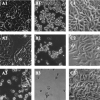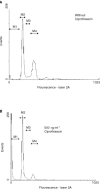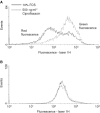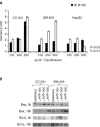Ciprofloxacin induces apoptosis and inhibits proliferation of human colorectal carcinoma cells - PubMed (original) (raw)
Ciprofloxacin induces apoptosis and inhibits proliferation of human colorectal carcinoma cells
C Herold et al. Br J Cancer. 2002.
Free PMC article
Abstract
Efficacy of chemotherapy in advanced stages of colorectal tumours is limited. The quinolone antibiotic ciprofloxacin was recently shown to inhibit growth and to induce apoptosis in human bladder carcinomas cells. We investigated the effect of ciprofloxacin on colon carcinoma lines in vitro. CC-531, SW-403 and HT-29 colon carcinoma and HepG2 hepatoma cells (control cells) were exposed to ciprofloxacin. Proliferation was assessed by bromodeoxyuridine-incorporation into DNA and apoptosis was measured by flow cytometry after propidium iodide or JC-1 staining. Expression of anti-apoptotic Bcl-2 and pro-apoptotic Bax was analyzed by semiquantitative Western blot analysis and activity of caspases 3, 8 and 9 by substrate-cleavage assays. Ciprofloxacin suppressed DNA synthesis of all colon carcinoma cells time- and dose-dependently, whereas the hepatoma cells remained unaffected. Apoptosis reached its maximum between 200 and 500 microg ml(-1). This was accompanied by an upregulation of Bax and of the activity of caspases 3, 8 and 9, and paralleled by a decrease of the mitochondrial membrane potential. Ciprofloxacin decreases proliferation and induces apoptosis of colon carcinoma cells, possibly in part by blocking mitochondrial DNA synthesis. Therefore, qualification of ciprofloxacin as adjunctive agent for colorectal cancer should be evaluated.
Copyright 2002 The Cancer Research Campaign
Figures
Figure 1
Ciprofloxacin induces morphological signs of apoptosis in colon cancer cell lines. Colon cancer cells CC-531 (A) and SW-403 (B) as well as hepatoma cells HepG2 (C) untreated (1) and after 18 h of incubation with 100 μg ml−1 (2) and 500 μg ml−1 (3) of ciprofloxacin.
Figure 2
Ciprofloxacin inhibits DNA-synthesis in colon carcinoma cells. DNA-synthesis was measured by BrdU-incorporation in CC-531, HT-29, SW-403 and HepG2 hepatoma cells after treatment with 100, 200 or 500 μg ml−1 ciprofloxacin (24 h). Results for untreated cells were set at 100%. Values are means±s.d. of six independent experiments.
Figure 3
Apoptosis is induced after 24 h of incubation with ciprofloxacin. When compared to untreated control cells (A), incubation of SW-403 cells with 500 μg ml−1 (B) for 24 h caused a decrease of S/G2-cells (M3 and M4) and an increase of sub-G1-cells (M1) M2 marks cells in G1 phase.
Figure 4
The Ciprofloxacin effect on apoptosis induction of colon cancer cells is time-dependent. Apoptosis rates were measured using FACS analysis. Results are given as means±s.d. of at least three independent experiments.
Figure 5
Ciprofloxacin induces mitochondrial injury of CC-531 (A) and HepG2 (B) cells. Green fluorescence of JC-1 dye was assessed as a parameter for mitochondrial breakdown. Increased green fluorescence is detectable in CC-531 cells incubated with 500 μg ml−1 ciprofloxacin for 48 h (dotted line) compared to cells treated with 10% FCS alone (black line) but not in HepG2 controls.
Figure 6
Different caspases are activated after incubation with ciprofloxacin. Activity of caspase 3, 8 and 9 was measured by a colourimetric peptide substrate-cleavage ELISA. Cells were treated with 100, 200 or 500 μg ml−1 ciprofloxacin (24 h). Basal activity of untreated cells was set at 100%. Values are means±s.d. of five independent experiments. Dotted line –––: value for untreated cells.
Figure 7
Ciprofloxacin increases the Bax : Bcl-2 ratio time-depently in colon cancer cells. Values of untreated cells were set to 1. Representative Western blot showing the increase of Bax and decrease of Bcl-2 expression in CC-531 and SW-403 cells.
Similar articles
- Suppression of human prostate cancer cell growth by ciprofloxacin is associated with cell cycle arrest and apoptosis.
Aranha O, Grignon R, Fernandes N, McDonnell TJ, Wood DP Jr, Sarkar FH. Aranha O, et al. Int J Oncol. 2003 Apr;22(4):787-94. Int J Oncol. 2003. PMID: 12632069 - Role of mitochondria in ciprofloxacin induced apoptosis in bladder cancer cells.
Aranha O, Zhu L, Alhasan S, Wood DP Jr, Kuo TH, Sarkar FH. Aranha O, et al. J Urol. 2002 Mar;167(3):1288-94. J Urol. 2002. PMID: 11832715 - Overadditive anti-proliferative and pro-apoptotic effects of a combination therapy on colorectal carcinoma cells.
Herold C, Ganslmayer M, Ocker M, Blauberger S, Zopf S, Hahn EG, Schuppan D. Herold C, et al. Int J Oncol. 2003 Sep;23(3):751-6. Int J Oncol. 2003. PMID: 12888913 - The synthetic retinoid adapalene inhibits proliferation and induces apoptosis in colorectal cancer cells in vitro.
Ocker M, Herold C, Ganslmayer M, Hahn EG, Schuppan D. Ocker M, et al. Int J Cancer. 2003 Nov 10;107(3):453-9. doi: 10.1002/ijc.11410. Int J Cancer. 2003. PMID: 14506747 - Effects of antioxidants and caspase-3 inhibitor on the phenylethyl isothiocyanate-induced apoptotic signaling pathways in human PLC/PRF/5 cells.
Wu SJ, Ng LT, Lin CC. Wu SJ, et al. Eur J Pharmacol. 2005 Aug 22;518(2-3):96-106. doi: 10.1016/j.ejphar.2005.06.021. Eur J Pharmacol. 2005. PMID: 16054126
Cited by
- Moxifloxacin and ciprofloxacin induces S-phase arrest and augments apoptotic effects of cisplatin in human pancreatic cancer cells via ERK activation.
Yadav V, Varshney P, Sultana S, Yadav J, Saini N. Yadav V, et al. BMC Cancer. 2015 Aug 11;15:581. doi: 10.1186/s12885-015-1560-y. BMC Cancer. 2015. PMID: 26260159 Free PMC article. - Using antimicrobial adjuvant therapy in cancer treatment: a review.
Alibek K, Bekmurzayeva A, Mussabekova A, Sultankulov B. Alibek K, et al. Infect Agent Cancer. 2012 Nov 20;7(1):33. doi: 10.1186/1750-9378-7-33. Infect Agent Cancer. 2012. PMID: 23164412 Free PMC article. - Investigation of the Pathogenic Mechanism of Ciprofloxacin in Aortic Aneurysm and Dissection by an Integrated Proteomics and Network Pharmacology Strategy.
Chen Z, Wu J, Wang W, Tang X, Zhou L, Lv Y, Zheng Y. Chen Z, et al. J Clin Med. 2023 Feb 6;12(4):1270. doi: 10.3390/jcm12041270. J Clin Med. 2023. PMID: 36835806 Free PMC article. - N-Acylated Ciprofloxacin Derivatives: Synthesis and In Vitro Biological Evaluation as Antibacterial and Anticancer Agents.
Struga M, Roszkowski P, Bielenica A, Otto-Ślusarczyk D, Stępień K, Stefańska J, Zabost A, Augustynowicz-Kopeć E, Koliński M, Kmiecik S, Myslovska A, Wrzosek M. Struga M, et al. ACS Omega. 2023 May 18;8(21):18663-18684. doi: 10.1021/acsomega.3c00554. eCollection 2023 May 30. ACS Omega. 2023. PMID: 37273589 Free PMC article.
References
- AranhaOWoodJrDPSarkarFH2000Ciprofloxacin mediated cell growth inhibition, S/G2-M cell cycle arrest, and apoptosis in a human transitional cell carcinoma of the bladder cell line Clin Cancer Res 6891900 - PubMed
- BrattonSBMacFarlaneMCainKCohenGM2000Protein complexes activate distinct caspase cascades in death receptor and stress-induced apoptosis Exp Cell Res 2562733 - PubMed
- ChenAYLiuLF1994DNA topoisomerases: essential enzymes and lethal targets Ann Rev Pharmacol Toxicol 34191218 - PubMed
- DudichESemenkovaLDudichIGorbatovaETochtamishevaNTatulovENikolaevaMSukhikhG1999Alpha-fetoprotein causes apoptosis in tumor cells via a pathway independent of CD95, TNFR1 and TNFR2 through activation of caspase-3-like proteases Eur J Biochem 266750761 - PubMed
Publication types
MeSH terms
Substances
LinkOut - more resources
Full Text Sources
Other Literature Sources
Medical
Research Materials
Miscellaneous






